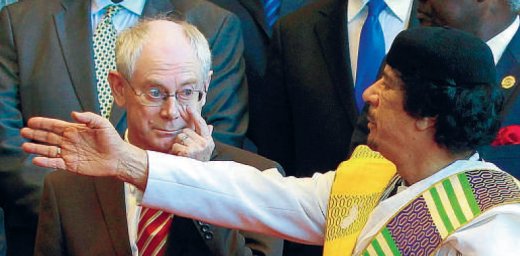Just Like Chamberlain
From the desk of Ernest Baert on Mon, 2011-02-21 18:35

Neville Chamberlain is known as a politician who naïvely believed that Hitler was a reasonable man with whom one could do business. Churchill knew better, and used the word appeaser for someone "who feeds a crocodile, hoping it will eat him last".
Last year, new members had to be elected for the UN Human Rights Council. Of all the countries in the Middle East and Northern Africa, Libya is the country where the army acted in the most brutal way against protesters. According to Human Rights Watch, there were more than 100 deaths in four days, partly because security forces used mortars and even machine guns against unarmed civilians. Such is exceptional even in that region.
Still, a few months ago Belgium voted for Libya as a full member of the Human Rights Council of the United Nations. Steven Vanackere, Belgium's minister of Foreign Affairs, defended his decision last month as follows:
Steven Vanackere"Libya has ratified most of the human rights conventions of the UN. Those against racial discrimination, about the prevention and punishment of genocide, or even those against torture and other cruel, inhuman or degrading treatment and punishment, were ratified by Libya but not by, for example, other candidate members like Angola."
"The inclusion of a country in the Human Rights Council can be a way to engage it towards more respect for human rights. Through the membership, it is exposed to a daily dialogue and monitoring of its own human rights situation. The voting instruction contained an order to refer in a verbal note to the clean slate situation and to indicate that Belgium was counting on a constructive attitude in the Human Rights Council. "
"In its application, Libya entered into a number of voluntary pledges and commitments. These pledges are situated in the field of cooperation with regional human rights bodies and the Office of the UN High Commissioner for Human Rights, the promise of a constructive dialogue to engage with society and Human Rights NGO's, a commitment to achieve the right to development, and to cooperate with all UN Member States to protect and safeguard human rights."
The vote was secret. It is believed that most, but not all, EU countries voted in favor. How could minister Vanackere think that Libya is a country where the regime would not shoot at hundreds of unarmed civilian demonstrators, or that Gaddafi is not a crocodile?
Curiously, Minister Vanackere stated that Belgium would not have voted for Iran:
"Our country would not have voted for Iran if that country had not withdrawn its candidacy under international pressure. Belgium was one of the countries that exerted international pressure against the Iranian candidacy, through an explicit bilateral approach."
Somewhere, somehow, minister Vanackere must have decided that Gaddafi has become over the years a more reasonable man than the Iranian mullahs. However, a leopard does not change his spots. An absolute dictator only hits the top by sparing nothing and nobody. Such a person never changes. It suffices to read what Freedom House has to say about human rights in Libya or Amnesty International or Unwatch. Human Rights Watch writes:
"Over the past decade Libya dramatically transformed its international status from a pariah state under UN, EU and US sanctions to a country that, in 2009 alone, held the Presidency of the UN Security Council, the chair of the African Union and the Presidency of the UN General Assembly. But this transformation in Libya’s foreign policy has not galvanized an equivalent transformation of Libya’s human rights record which remains poor, despite some limited progress in recent years."
Vanackere could have learnt some lessons from Gaddafi's call for an international jihad against Switzerland because that country had arrested his son Hannibal on charges of beating up two servants in a Swiss hotel.
It is not because in 2003, after seeing what had happened to Saddam Hussein and his family, Gaddafi was afraid of the possible consequences of its nuclear program, and therefore put away his nuclear ambitions, that the West should give him the honor of standing on a Human Rights podium. This shows that the transformation of the UN Human Rights Commission into a so-called Human Rights Council in 2006 did not change the basic fact: the idea that a dictatorship has anything meaningful to say about human rights is insane. Only a multiculturalist can believe this or play along in such a show.
Contrast this wishful thinking about dictators with a man universally derided as dumb by the "thinking classes" in the US and Europe: Ronald Reagan, who not only was one of the very few to understand the USSR would crumble if the West finally had the confidence to assert it was morally right, but who also called Ghadaffi a "mad dog". Colourful maybe, spot on certainly. If only President Obama had the same judgement as Ronald Reagan.
Even today, while blood is flowing in the streets of Tripoli and Benghazi, minister Vanackere remains soft on Gadaffi:
"There is no need for the EU to target Muammar Gaddafi personally"
But let's end with a positive note. At least minister Vanackere made public how Belgium had voted, something the Obama administration did not have the guts for. He took the personal responsibility for the decision and for the lack of consensus in his administration, and he explained the motivation for the decision. Still, he should have shown more courage.

